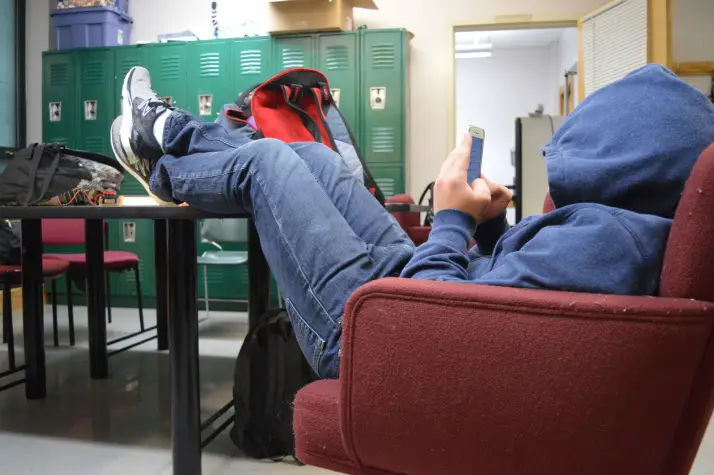Goodbye, Motivation
Take it from someone who thought she would never fall victim to the apathy of senior year—it’s real, it’s unavoidable and it’s a lot of fun.
By Gwynn Lyons, Stanford University
Although I’ve always had my lazy days, where all I want to do is lay in bed and stream TV shows, this quarter has been different.
Indifference has overshadowed my usual excitement about classes, my investment in relationships has waned and my general demeanor has changed from cheerful to grumpy. When I first observed this attitude shift I was disturbed, because I couldn’t attribute the change to anything directly observable in my life. Was I getting enough sleep and eating the right things? Was the weather impacting my mood?
Then it occurred to me: I was within months of graduating. I had come down with senioritis. Though the conclusion seems obvious now, it was unintuitive given my past life experiences. I had managed to ward off senioritis in high school and, as a result, thought that I would be invincible for life. Succumbing to senioritis at the last moment seemed like pulling a hamstring just before reaching the finish line.
But, as they say, acceptance is the first step toward recovery. So, having self-diagnosed my condition, I did some introspection and uncovered its source.
Causes of Senioritis
It’s not just the fact that you’re in your fourth year of college that causes burnout. Senioritis is due to a combination of factors: the exhaustion of being in school for sixteen years, the stress of finding a job for the coming fall and the anxiety of transitioning from a familiar phase of life to an unfamiliar one.

The constant grind of exam preparation, paper writing and close reading is the default state of existence in school. It’s not until you take a break that you realize that schoolwork takes a toll like any other job. Unlike other jobs, however, you’ve been working at it since kindergarten, so it is natural that your mind and body would demand a break.
Plus, in your senior year, when coupled with a job search, schoolwork becomes especially burdensome. Searching for a job is a job itself, and, when balanced with a full course load, it leaves very little time for much-needed relaxation. Comparing yourself to friends who already have jobs lined up or who are continuing their education can make you feel like you have no direction.
I recently talked with a friend who told me about a debate his family had over life transitions. The question was: Which transition is more difficult, the one from high school to college, or the one from college to post-college? Both of us agreed that it was the latter.
Before college ends, you are mostly supported by your parents. Even if you’re not living at home, most of your needs are provided for by the university. But after college, you’re expected to make money, handle your own bills and clean and cook for yourself. Your past life experience does not prepare you for the responsibilities you have as an adult. Anticipating this unknown void produces anxiety.
Indifference, laziness and irritability are understandable responses to these feelings. Nihilistic attitudes protect you from the uncertainty of the future by allowing you to accept whatever comes after graduation. Laziness results from feeling the cumulative effects of rigorous schooling, and grumpiness from coming to terms with the fact that, after going though the intellectual wringer, you now have to work.
The Road to Recovery
As pessimistic as this all seems, there are ways to mitigate senioritis, or at least come to terms with it.
“Senior spring,” the last semester of college where seniors take light course loads, exists for a reason—to allow a short reprieve from academic stress before being immersed in the post-college world. Marked by get-togethers with friends, last-minute hookups and the foreshadows of nostalgia, it’s youth’s last hurrah. Planning your schedule so that you are at the minimum academic load for spring semester will put you in a position to profit from this designated relaxation time.
Another way to combat burnout is to invest yourself in on-campus activities, which can give you a productive outlet for unproductive anxiety about the future. Spending time volunteering or participating in activist groups can dismantle your indifferent attitude about the future, and remind you that you can use your career to do something good for the world.
None of this will happen, however, if you don’t first accept that you have senioritis.
If you’re feeling like you’re the only one with this affliction, talk to your friends. In my experience, all seniors have thought about the impending end of their education. Getting a sense of the variety of paths people plan to take after graduating will make you realize the number of exciting directions the future may take you, many of which you may not have realized existed.
Lessons from Senioritis
You will eventually beat senioritis, if not during your last semester of college, then soon after. When you’re back to normal, you’ll see how little your minor hiccup in motivation mattered in the grand scheme of your life. And, hopefully, this realization will help you manage your response to other life changes, whether it’s moving, ending a relationship or changing careers.
In the meantime, it’s okay to have a senior moment, or a couple. So far, there haven’t been any cosmic consequences for my skipping a few lectures or watching Netflix during the time I had allotted for writing cover letters. At the very least, experiencing senioritis is something that you can bond over with your senior friends. You’ll cringe about it now, but laugh about it later.
Senioritis is the last growing pain of childhood. While it is uncomfortable, it is the privilege of young people to experience. When you finally go from afflicted senior to newly minted adult, you will appreciate the years of education you’ve had, and what you saw as a painful ending will reveal itself to be an interlude preceding a new beginning.
At times when I feel the most stressed, confused or uncertain in this last quarter of college, I like to think about what Steve Jobs said in his commencement speech at Stanford: “You have to trust that the dots will somehow connect in your future. You have to trust in something—your gut, destiny, life, karma, whatever. This approach has never let me down, and it has made all the difference in my life.”

















